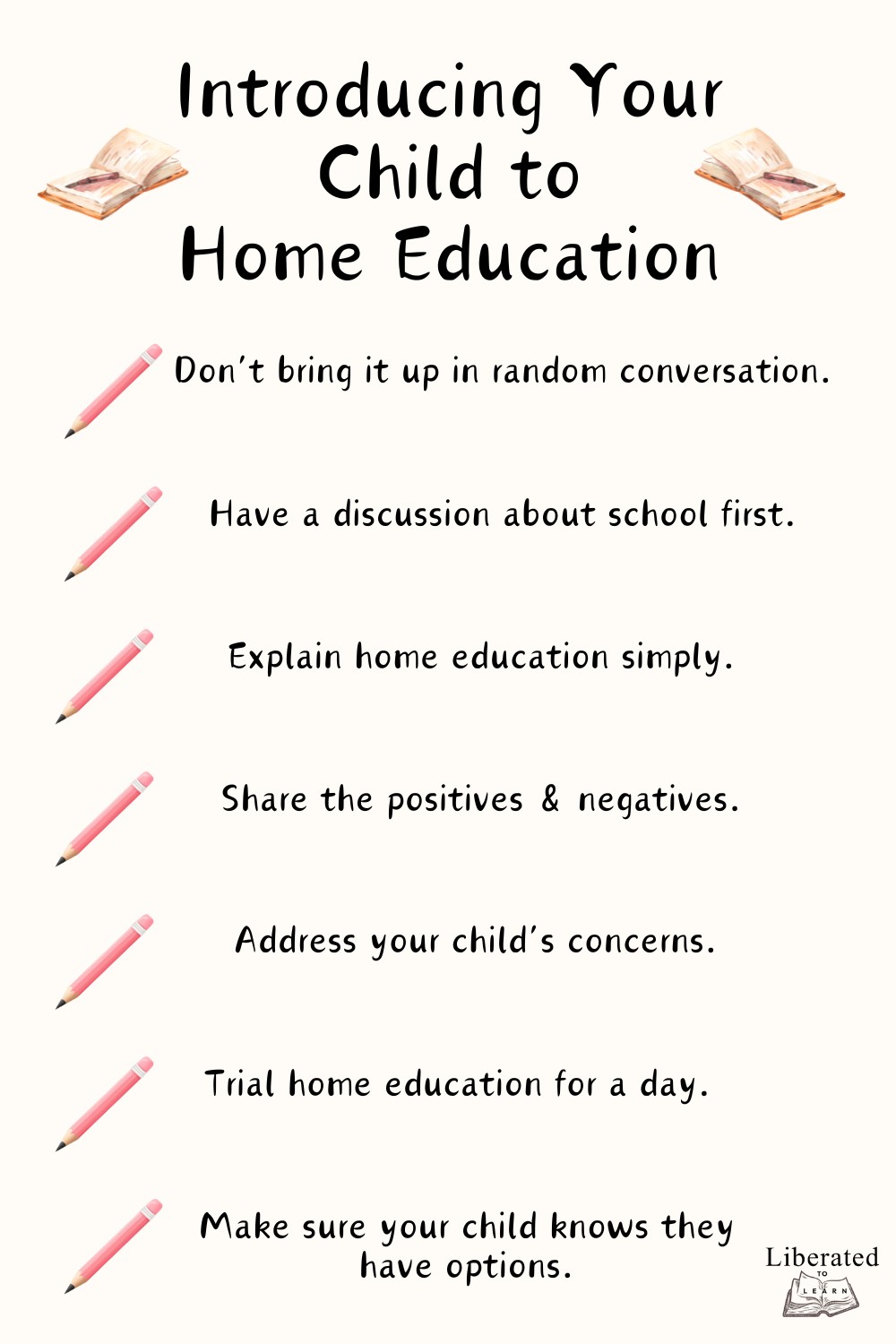We have 7 tips on introducing your child to home education so that they know it’s an option for them!

Home education has grown increasingly popular in recent years, with an estimated 92,000 children being home educated in 2023 alone — and that doesn’t include those who haven’t been in contact with their local authority, so the number is sure to be much higher!
But whilst it’s popularity increases, home education is still a fairly new concept to a lot of people. It’s also an entirely different concept to children, especially those who are in school because they will be used to a traditional environment and traditional methods of learning.
Everyone has different reasons for wanting to home educate, and the happiness of our children is the top priority. If school isn’t working out or is causing a lot of issues, you’ve likely decided that home education would be a better option for your child. But you’re also probably wondering how you can introduce your child to home education, especially if they’ve been in the schooling system for a while, as that is what they will be used to. In fact, the idea of home education may be completely foreign or seem strange to them.
Fear not, we have 7 tips on introducing your child to home education so that they know it’s an option for them!

7 Tips on Introducing Your Child to Home Education
Don’t bring it up in random conversation
You might think that it’s easier to bring up home education in random conversation, perhaps to introduce it more casually, but it’s something that could immediately overwhelm your child and a concept that they could easily disregard altogether.
Instead, we recommend slowly introducing your child to the idea of home education so that they’re aware of what it is. Ask them if they know what home education means and if they don’t, explain it to them. Leave it at that and see if they ask more questions. Over time, you can start to have more conversations about considering it and whether it will be a good choice.
Have a discussion about school first
Discussing school first is useful for a number of reasons. One, it gets your child to open up about how school is going, whether they’re enjoying it or if there are any issues. Two, as a parent, you can gauge whether your child will be happy to transition from school to home education. Three, it provides an opportunity to bring up the idea of home educating and makes your child aware that it is an option for them.
Explain home education simply
The last thing you want to do is overwhelm your child with information. They don’t need to know all the facts about home education from the get-go, so start with a simple explanation and see if they are intrigued to know more. Make sure they understand what home education is and isn’t, and how it is different from school.
Share the positives and negatives of Home Education
Sharing the positives about home education will hopefully encourage your child to give it a try. It also gives your child something to look forward to.
You might be reluctant to share the negatives of home education in case it puts your child off, but it’s always best to be open and honest. If your child knows both the positives and negatives, they will know what to expect and have less of a shock. It also allows them to make an informed decision about whether they want to be home educated.
Address your child’s concerns
If your child has any concerns, it’s always best to address them. We don’t want to try and persuade our children to start Home Education, instead we should accept their worries and acknowledge that they are valid. Then we can suggest alternatives or ways of dealing with certain concerns.
Related: Your Concerns About Homeschooling: Answered
Trial home education for a day
The best way of introducing your child to home education is trialling it for a day. Obviously if your child is in school, this can be done over the weekend or during the holidays. Remember, home education doesn’t have to look anything like school at home. Instead, you can try a unique routine or be completely flexible. It’s all about experimenting and finding out what will work best for your family.
Make sure your child knows they have options
The most important thing about introducing your child to Home Education is making sure that they know they have options. The last thing you want is your child feeling like they have no other choice or that they’re forced to do one thing or the other.
Some children are perfectly happy in school, whilst others thrive being home educated. And some children might need a bit of both, which is why flexi-schooling might be a good option. As long as the options are there and spoken about, things will be much easier.

What To Do Before You Start Home Educating
Don’t rush into anything
Before you even start home educating, don’t rush into it. As the saying goes, it’s a marathon, not a sprint, and it takes time to ease into and figure things out. So, take each day as it comes and be prepared to be flexible and open-minded.
Involve your child in the decision making
Always involve your child in any decision making, whether it be choosing between home education and school, figuring out a learning style or whatever else it may be. After all, it’s their education — but not only that, it’s their childhood too.
Introduce home education gradually
As mentioned, it’s important not to rush into things, so introducing home education gradually will give everyone the best chance of experiencing it properly and easing into it.
If you’re wondering what we mean by gradual, start with deschooling. The best thing about home education is that there is no right or wrong, and there is always time to figure things out or start over again.
Stay positive and supportive
Once you introduce your child to home education and before you even begin, always stay positive and supportive. It’s a big change and, for some, it’s an even bigger adjustment. Whilst some children find their way fairly quickly, others may take more time. There will also be ups and downs, doubts and anticipation, which is all normal. Staying positive and supportive will help your child to feel more at ease, and they will know that you are there for them, no matter what.
Find great resources
There are endless resources out there—resources that will help you with every stage of your home education journey. So, feel free to read as many books and posts, watch as many videos and research as much as you like. It’s also good to introduce your child to some home education resources so that they get an idea of what it will be like.
Celebrate this new journey
Lastly, before you start home educating, celebrate the new journey that you are about to embark on. It can be as simple as spending some quality time with your child or even throwing a little home education party!

m@liberated
Want more from Liberated to Learn?
Subscribe to stay updated about new posts, resources and giveaways!












